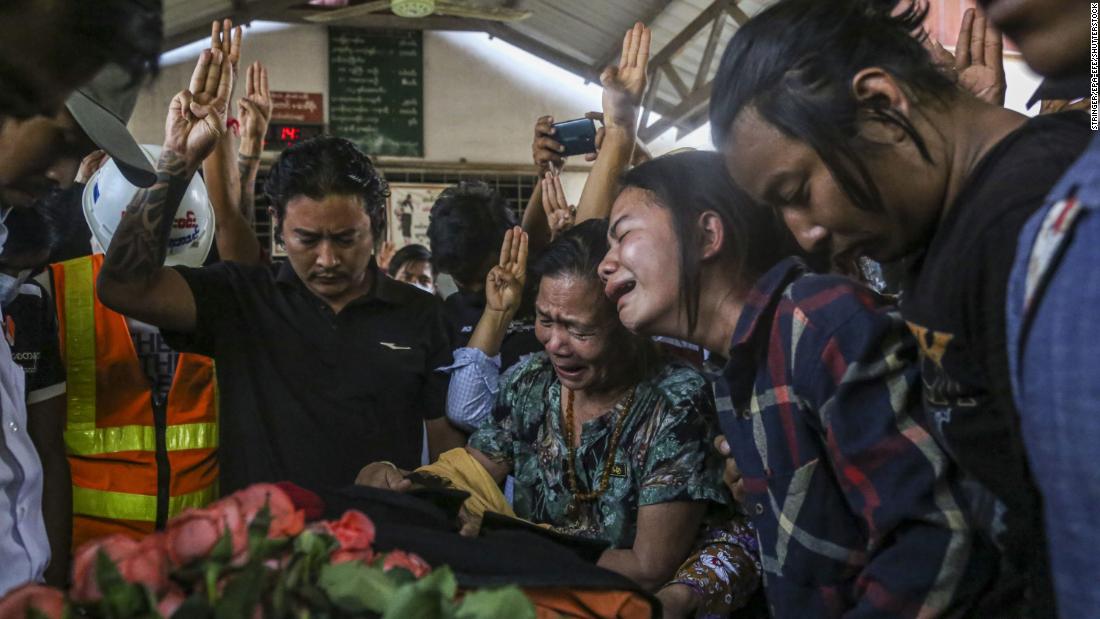In one unverified picture, a protester can be seen huddled under a temporary shield while holding the shirt of a fallen fellow demonstrator.
At least 16 people were killed on Sunday in other regions across the country, including in the second city of Mandalay and in Bago, where state media said a police officer had died of a chest wound after a confrontation with protesters, Reuters reported. This is the second policeman reported dead in the protests.
According to the AAPP, the death toll from the weekend on the deaths has been at least 126 people since the coup.
The Chinese embassy in Myanmar said several factories funded by China were smashed and set on fire in Yangon’s industrial zone on Sunday. According to the embassy, Chinese citizens were also injured
It is unclear who the perpetrators were and no group claimed responsibility for the fires.
“China urges Myanmar to take further effective action to stop all violence, punish the perpetrators according to the law and ensure the safety and security of the lives of Chinese enterprises and staff in Myanmar,” CGTN said in a statement. embassy quoted.
Anti-coup protesters were suspicious of China, with regular demonstrations at the Chinese embassy in Yangon and protesters accusing Beijing of supporting the coup and junta.
Although China did not directly condemn the military takeover, it backed a statement from the United Nations Security Council saying it “strongly condemned the violence against peaceful protesters” and called on the military to “exercise extreme self-control”. to exercise.
In its statement on Sunday, China called on protesters in Myanmar to make their demands legal and not to undermine bilateral ties with China.
After the bloodshed, the military junta instituted martial law in Hlaingthaya, one of the largest districts in the city where many poor factory workers live, according to the state-run news channel MRTV. Local media reported that martial law was also declared in the Shwepyithar district in Yangon. On Monday, the army declared martial law in four more Yangon townships, North Dagon, North Okkalapa, South Dagon and Dagon Seikkan – areas where most of the city’s factories are located.
Martial law under the junta’s regime means that the military commander of the Yangon region is gaining ‘full administrative and judicial authority’ in districts where martial law is declared, according to local media Myanmar Now.
According to the internet monitoring service NetBlocks, mobile networks were deactivated ‘nationwide’ on Monday, despite the restoration of the internet connection, after the 29th consecutive night was switched off. Protesters and journalists relied on their cellphones to watch demonstrations live and document police repression.
“People have the right to defend themselves”
As protests continue throughout Myanmar, the leader of a group of lawmakers ousted by the military has vowed to pursue a ‘revolution’ to overthrow the ruling junta.
Mahn Win Khaing Than, who was the speaker of the upper house of parliament before the coup, said in a video address on Facebook: “This is the darkest moment of the country and the moment that dawn is near.”
“To form a federal democracy that all ethnic brothers, who have suffered for decades through the dictatorship through various forms of oppression, really want, this revolution is the opportunity for us to put our efforts together,” Mahn Win Khaing said. Than, who is an ethnic Karen, said.
He also said that the civilian government “is trying to legislate the required laws so that the people have the right to defend themselves” against the military repression, reports Reuters.
The military considers the CRPH illegal and has warned that anyone working with them will face charges of treason. According to My Reuters, the CRPH has declared the army in Myanmar a ‘terrorist organization’.
On Sunday, Christine Schraner Burgener, the UN Secretary-General’s Special Envoy for Myanmar, issued a statement condemning the ‘continuing bloodshed in the country’, as the military contested international calls, including the Security Council, for restraint. dialogue and full respect for human rights and fundamental freedoms. ‘
“The special envoy personally heard over the weekend the contact in Myanmar who is saddened by murders, abuse of protesters and torture of prisoners,” she said.
Why is Myanmar protesting?
The now-reformed Electoral Commission denied that there was evidence of mass voter fraud.
It was only the second democratic vote since the previous military junta began a series of reforms in 2011, after half a century of brutal military rule that put Myanmar, then known as Burma, in poverty and isolation.
Despite the danger, thousands of young protesters marched on the army. The protests are dominated by young people who grew up with a level of democracy and political and economic freedoms that their parents or grandparents did not have, and say they are fighting for their future.
CNN’s Hira Humayun and Richard Roth reported.
